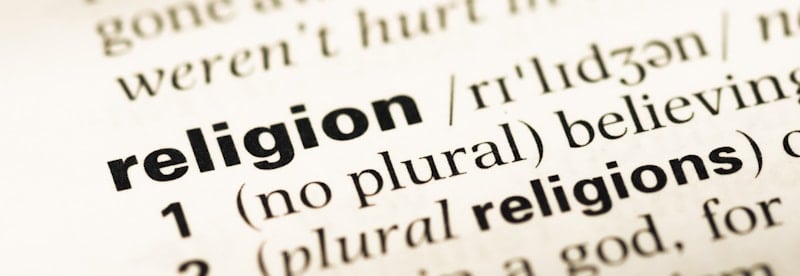Discussing religion and politics on social media and people, in general, is never advisable. By doing that, you are less likely to enlighten people or let them know your viewpoint than offending them. And if you are getting the spellings and capitalization of certain religions and religious terms wrong, you could further end up hurting people’s deep-seated religious sentiments.
Names of specific religions are capitalized in writings because they are proper nouns. Therefore, religions such as Christianity, Judaism, Islam, Hinduism, Buddhism, Shintoism, etc., must always be capitalized. And this rule applies even when discussing specific denominations, sects, etc.
Besides the names of specific religions, pretty much all names and terms relating to beliefs are capitalized. Keep reading to learn everything you need to know about the capitalization rules regarding names of religions, holy books, various religious terms, etc.

Capitalizing Religious Terms
As a rule, you must typically capitalize the initial letter of a religious term when the term is used as a name or a proper noun. In religious contexts, a proper noun could be:
- Religions and different religious movements
- Religious deities and fixtures
- Holy texts
- Religious holidays
- Titles used in combination with a name (for example, Pope Francis)
There, however, are specific scenarios where the right capitalization could depend on how the term is being used.
In Reference (and Reverence) to God
The term “god” could be capitalized or not based on how it’s used in a sentence. In other words, if it denotes a particular deity, it is capitalized. If the noun is used in general, it is written in lowercase.
If denoting the Christian deity, the letter “G” in “God” should be capitalized. For example:
- I am here purely by God’s grace.
However, as mentioned above, if you refer to goddesses and gods generally, or any goddess or god where the word “god” isn’t a name or proper noun, the lower case “g” should be used. For example:
- Before Christianization, people in various parts of Europe worshipped the Germanic goddesses and gods, which included the goddess Eostre.
Kindly note that Eostre’s goddess of the spring and dawn is capitalized in the above sentence even though the noun “goddess” is written in small letters, because the noun “goddess” is not a proper noun unlike Eostre.
The following are different ways in which you can refer to god and the varying capitalization rules that usually apply:
- the Almighty
- bread of life
- the comforter
- eternal God
- the Creator
- the Father
- Jesus Christ
- Allah
- Spirit of God
- Savior
- the Lamb of God
- the Holy Spirit
- our Redeemer, etc.
Among the many terms used in religious texts or general writing, the term “god” is a word whose capitalization rules vary based on the context.
There are several religious terms with secondary meanings. And those words must be capitalized only if you’re using the words within religious contexts and not when used elsewhere.
For example, the word “Catholic” is capitalized when it’s part of a name, as in “the Catholic Church” or referring to a Catholic. However, the term “Catholic” could also mean “all-encompassing” or “all-embracing”. When the word is used to refer to some person with interests in various unrelated things, it could be lowercased – for example, a person with “catholic tastes”.
Capitalizing “Gospel”, “Church”, and “Mass”
Similar to the word “god”, the noun “gospel” is also capitalized based on context.
Generally, “gospel” is written in lowercase. But when referring to a particular book – for instance, the Gospel of Mark or the New Testament’s four-book division (the Gospels) – “gospel” is capitalized. When generally referring to Christian messages, the word “gospel” is lowercase.
The word “church”, on the other hand, is capitalized only when it’s part of a name or proper noun – for instance, the “Church of England”. Similarly, the term “evangelical” is lowercase when it denotes a set of beliefs part of the Protestant framework, or when used as an adjective referring to the “act” of evangelizing, as in “Evangelical Outreach”.
Also, the noun “Mass” must be capitalized if referring to the religious ceremony conducted in a church. However, the word is not capitalized when used as an adjective – for example, “mass transit”, “mass market”, etc. It, therefore, pays to double-check if there is any religious connotation to the term when used in writings.
Heaven and Hell
The terms “heaven” and “hell” should not be capitalized. This rule applies even when the reference is to the “Christian theory”. Some religious institutions, however, do opt to capitalize the two terms.
Needless to say, when the terms are used in proper nouns or names, they must be capitalized. For example, always capitalize the word “Heaven” if it is denoting the popular London nightclub.
Names of Holy Texts
Religious text titles are always capitalized, which includes the Holy Bible, the Quran, the Torah, etc., as they are all proper names too. However, the word “bible” could be used as a general noun as well – for instance, “fisherman’s bible”. Generally, when referring to a particular religious text, capitalize the name of the book.
On a related note, one word you do not usually capitalize is “biblical”. Despite the term being an adjective describing a proper name, it is not capitalized. It’s believed to have been capitalized in classic texts of the past, but it is no longer capitalized. A major reason for this is it does not always refer to the Bible when it is used as an adjective.
For example, the word “biblical” in a phrase like “biblical proportions” has nothing to do with the holy Christian text. It instead signifies “grandness” or “enormity” that could be likened to the Holy Bible, but which isn’t exclusive to the Bible. But when the word does direct at the Bible, it’s capitalized.
Here are some sentences using the adjective, with references to the Bible and without any direct connection to the book:
- The objective was to correct the biblical texts.
- The Latin poem has a curious commixture of Biblical history.
- There is a certain biblical cadence or inflection in the way she utters the last words.
- The region needs rainfall of biblical proportions for normalcy to be restored.
Names of Holy People and Theological Concepts
Names of holy individuals or titles of revered and holy persons are capitalized as they are proper nouns.
- The Blessed Virgin
- Mother Superior
- Our Lady of Sorrows
- Saint Jerome
Names of theological concepts are also capitalized:
- the Fall
- the Nativity
- the Flood
- the Second Coming
- Original Sin
- the Holy Grail
- the Chosen People
- the Holy of Holies
Names of Sects, Orders, and Denominations
The following are specific denominations, orders, sects, and religious movements that are generally capitalized in writings (there could be exceptions, however, as mentioned above):
- Amish communities
- Anglicanism; the Episcopal Church; the Anglican Communion
- Baptists; the Southern Baptist Convention; Anglican Communion
- Church of Ireland
- Church of England
- Conservative Judaism
- Eastern Orthodox churches
- Methodism; Wesleyan; United Methodist Church
- Jesuits; Society of Jesus
- Roman Catholicism; Roman Catholic Church
- Protestantism; Protestant
- Sunnism; Sunnite
- Shiism; Shiite; Shia
- Zen Buddhism; ZenShiism; Shiite; Shia
Names of highly revered works, such as scriptures, in different forms, are also usually capitalized, which include:
- Bible; biblical
- the Holy Bible
- Tripitaka (Buddhist scripture)
- the Hebrew Bible
- Quran or Koran
- Psalter
- Vulgate (the Bible’s Latin translation)
- Septuagint (the Old Testament in Greek)
Names of people practicing religion are also capitalized since those are also proper names or adjectives describing a proper noun. In other words, capitalize terms such as Catholic, Muslim, Jew, Protestant, Buddhist, etc.
Similarly, names of religious holidays are also capitalized. In other words, when referring to Christmas, Easter, Ramadan, Hanukkah, and other holidays, capitalize those names. If the holiday name has multiple words or has “day” in its name, you must capitalize “day” too.
Reverential Capitalization
In the past (and even now to a certain extent), capitalizing the first letter of a pronoun when referring to a religious figure was quite common. This practice of capitalizing a pronoun is called “reverential capitalization”. For example, if the pronoun “his” is used for referring to God, you may capitalize the letter “H”.
- The people’s hearts will rejoice in His holy name!
Such capitalization of pronouns is rare in modern writing, however.
When using reverential capitalization, adhere to these two rules:
- Only use it on pronouns that denote divine beings and deities.
- Apply it throughout your writing consistently.
For consistency’s sake, proofread your writing or have it looked at by someone else. And if you let another person go through your manuscript, let them know the terms you have chosen to capitalize.
Conclusion
To conclude, religion or religious names are always capitalized. Quite a few of them are derived from proper names – for example, Christianity, Buddhism, Judaism. Judaism is derived from Judah. Some other religions have names based on their organizational groups, such as Methodists, Catholics, and Congregationalists.
The word “atheism” is perhaps the only spiritual-based belief system that is not considered a proper name or noun. It is, therefore, not capitalized in sentences. The term “atheism” is not considered a proper noun because it is not derived from or based on a unique name, unlike religion names.
Shawn Manaher is the founder and CEO of The Content Authority. He’s one part content manager, one part writing ninja organizer, and two parts leader of top content creators. You don’t even want to know what he calls pancakes.



